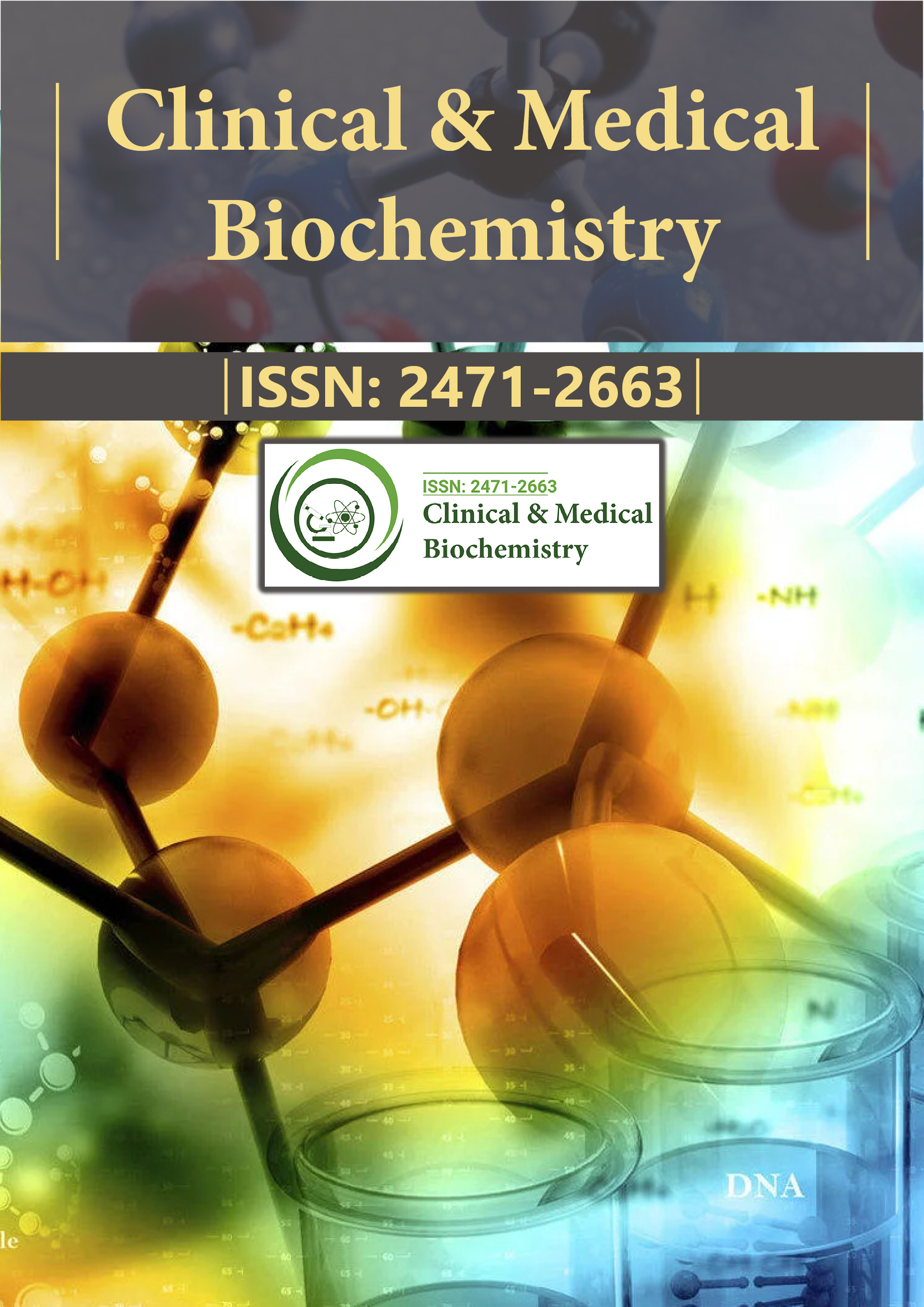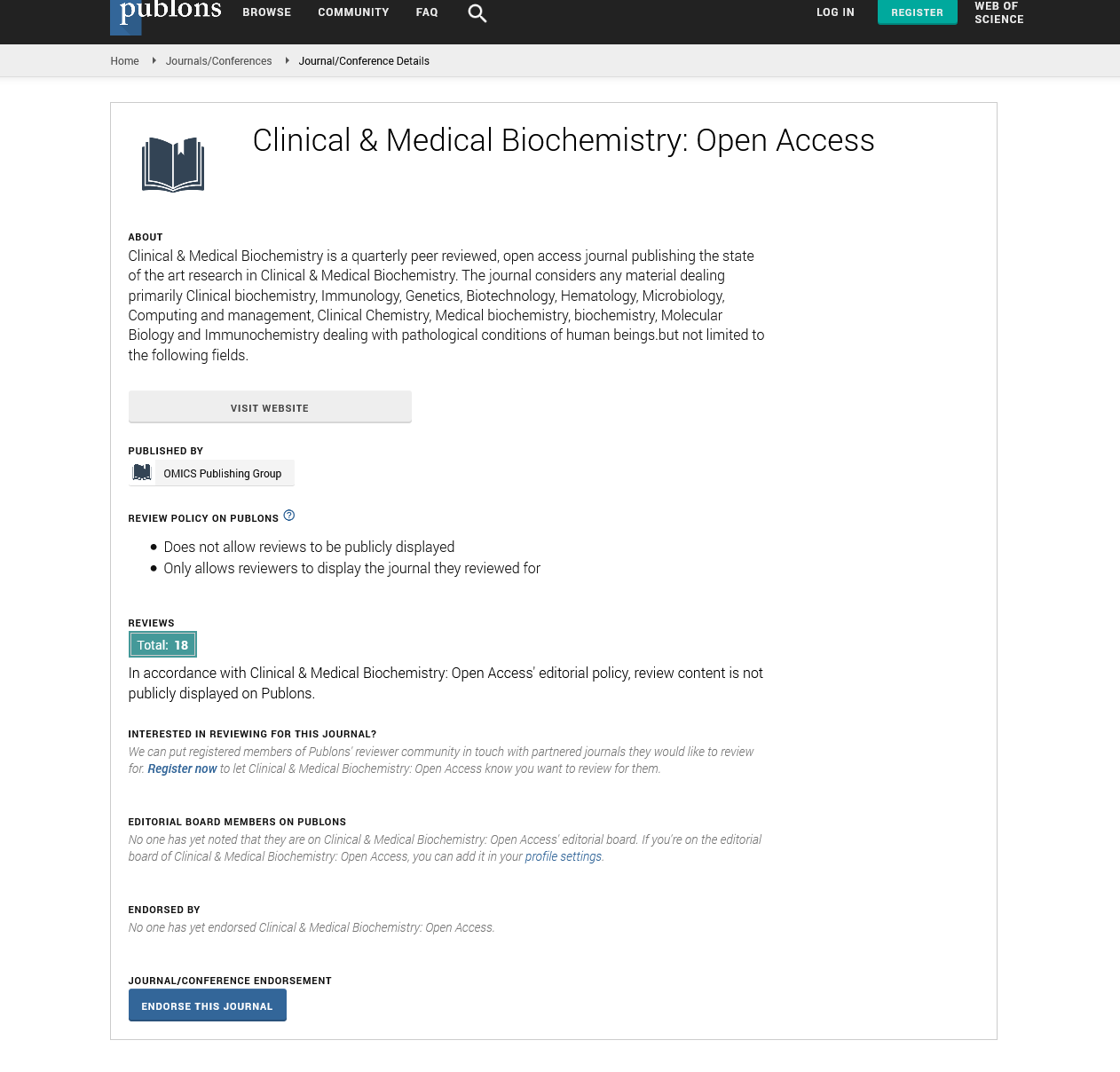Indexed In
- RefSeek
- Directory of Research Journal Indexing (DRJI)
- Hamdard University
- EBSCO A-Z
- OCLC- WorldCat
- Scholarsteer
- Publons
- Euro Pub
- Google Scholar
Useful Links
Share This Page
Journal Flyer

Open Access Journals
- Agri and Aquaculture
- Biochemistry
- Bioinformatics & Systems Biology
- Business & Management
- Chemistry
- Clinical Sciences
- Engineering
- Food & Nutrition
- General Science
- Genetics & Molecular Biology
- Immunology & Microbiology
- Medical Sciences
- Neuroscience & Psychology
- Nursing & Health Care
- Pharmaceutical Sciences
Perspective - (2023) Volume 9, Issue 6
The Molecular Medicine Revolution: Transforming Healthcare for the Future
Akash Aryan*Received: 23-Oct-2023, Manuscript No. CMBO-23-24115; Editor assigned: 26-Oct-2023, Pre QC No. CMBO-23-24115 (PQ); Reviewed: 14-Nov-2023, QC No. CMBO-23-24115; Revised: 21-Nov-2023, Manuscript No. CMBO-23-24115 (R); Published: 28-Nov-2023, DOI: 10.35841/2471-2663.23.9.199
Description
Molecular medicine is a dynamic and rapidly evolving field that sits at the intersection of biology, medicine, and technology. At its core, molecular medicine seeks to understand and treat diseases at the molecular and cellular levels, harnessing the power of genetics, genomics, and advanced technologies to unlock the secrets of health. This interdisciplinary approach has revolutionized our consideration of diseases, paving the way for personalized medicine and innovative therapeutic interventions.
Considerate the molecular basis of diseases
One of the key objectives of molecular medicine is to remove the molecular basis of diseases. Traditional medicine often addresses symptoms without delving into the underlying molecular mechanisms. Molecular medicine, on the other hand, investigates the root causes of diseases, exploring the intricate interactions between genes, proteins, and other molecular components. The Human Genome Project, completed in 2003, was a monumental milestone in molecular medicine. It provided a comprehensive map of the human genome, revealing the sequence of DNA that encodes the instructions for building and maintaining a human being. This monumental achievement laid the foundation to considerate genetic variations and their implications in health and disease.
Genomics and personalized medicine
Genomics, a branch of molecular medicine, focuses on the study of an individual's entire set of genes, known as the genome. Advances in DNA sequencing technologies have made it possible to sequence an individual's genome quickly and cost-effectively. This wealth of genetic information allows clinicians to tailor medical treatments to a patient's unique genetic makeup, a paradigm known as personalized medicine. Personalized medicine has transformed the treatment landscape for various diseases, including cancer. By analyzing the genetic mutations driving a specific cancer, clinicians can prescribe targeted therapies that address the molecular abnormalities responsible for the disease. This approach not only enhances treatment efficacy but also minimizes side effects, marking a significant shift from the one-size-fits-all model of traditional medicine.
Molecular diagnostics
Molecular diagnostics is another important aspect of molecular medicine. This involves using molecular techniques to detect and analyze biomarkers associated with various diseases. Polymerase Chain Reaction (PCR), DNA sequencing, and gene expression profiling are among the techniques employed in molecular diagnostics. The ability to detect diseases at the molecular level enables early and more accurate diagnosis. For instance, in infectious diseases, molecular diagnostics can identify the specific pathogens responsible, facilitating targeted and timely treatment. This precision in diagnostics has the potential to improve patient outcomes and reduce the spread of infectious agents.
Therapeutic advances in molecular medicine
Molecular medicine has spurred remarkable progress in the development of novel therapeutics. Targeted therapies, gene therapies, and RNA-based therapies are among the innovative approaches that have emerged from molecular medicine research. Targeted therapies focus on specific molecular targets involved in the growth and survival of cancer cells. These drugs, such as tyrosine kinase inhibitors, interfere with the signaling pathways that drive cancer progression. Targeted therapies have demonstrated remarkable success in treating certain types of cancer, leading to improved survival rates and quality of life for patients. Gene therapy involves the introduction, removal, or alteration of genetic material within a person's cells to treat or prevent disease. This approach holds great aptitude for inherited genetic disorders, offering the potential to correct or replace faulty genes. Recent breakthroughs in gene editing technologies, such as CRISPR-Cas9, have further accelerated the development of gene therapies. RNA-based therapies, including RNA interference (RNAi) and antisense oligonucleotides, target the RNA molecules involved in disease processes. These therapies have shown potential in treating genetic disorders, neurodegenerative diseases, and certain viral infections.
Challenges and ethical considerations
While the strides in molecular medicine are transformative, they come with challenges and ethical considerations. The rapid pace of technological advancements raises questions about the accessibility and affordability of cutting-edge molecular treatments. Ensuring equitable access to these therapies is a grave consideration to avoid exacerbating existing healthcare disparities. Ethical concerns also surround the use of genetic information, particularly in the context of personalized medicine. Issues such as privacy, consent, and the potential misuse of genetic data must be carefully addressed to uphold the principles of patient autonomy and confidentiality.
Conclusion
Molecular medicine stands at the forefront of a healthcare revolution, splitting the complexities of diseases and clear the way for personalized and targeted treatments. From accepting the genetic basis of diseases to developing innovative therapeutic interventions, the impact of molecular medicine is far-reaching. As research continues to advance, the field holds the ability of transforming healthcare, offering more precise and effective solutions for a wide array of medical conditions.
Citation: Aryan A (2023) The Molecular Medicine Revolution: Transforming Healthcare for the Future. Clin Med Bio Chem. 9:199.
Copyright: © 2023 Aryan A. This is an open-access article distributed under the terms of the Creative Commons Attribution License, which permits unrestricted use, distribution, and reproduction in any medium, provided the original author and source are credited.

